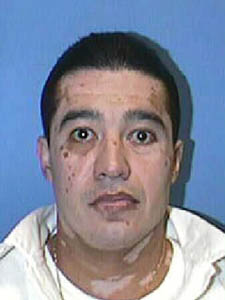Texas Executes Mexican National Despite Diplomatic Protests That His Death ‘Violates the U.S.’s International Obligations’
Daily Mail (London), January 22, 2014
A Mexican national was executed on Wednesday night in Texas for killing a Houston police officer, despite pleas and diplomatic pressure from the Mexican government and the U.S. State Department to halt the punishment.
Edgar Tamayo, 46, received a lethal injection for the January 1994 fatal shooting of Officer Guy Gaddis, 24.
Asked by a warden if he had a final statement, he mumbled ‘no’ and shook his head. As the lethal dose of pentobarbital began taking effect, he took a few breaths and then made one slightly audible snore before all movement stopped.
{snip}
Tamayo never looked toward Gaddis’ mother, two brothers and two other relatives who watched through a window. He selected no witnesses of his own.
Several dozen police officers and supporters of the slain patrolman revved their motorcycles outside the prison before witnesses were let inside the death chamber.
The execution, the first this year in the nation’s most active death penalty state, came after the U.S. Supreme Court and lower federal courts rejected last-day appeals and Texas officials spurned arguments that Tamayo’s case was tainted because he wasn’t informed, under an international agreement, that he could get legal help from the Mexican consulate after his arrest for the officer’s slaying.
Attorneys had also argued unsuccessfully that Tamayo was mentally impaired, making him ineligible for execution, and that the state’s clemency procedures were unfair.
{snip}
‘It doesn’t matter where you’re from,’ Perry spokeswoman Lucy Nashed said. ‘If you commit a despicable crime like this in Texas, you are subject to our state laws, including a fair trial by jury and the ultimate penalty.’
Gaddis, who had been on the force for two years, was driving Tamayo and another man from a robbery scene when evidence showed the officer was shot three times in the head and neck with a pistol Tamayo had concealed in his pants.
{snip}
Mexican officials and Tamayo’s attorneys contend he was protected under a provision of the 1963 Vienna Convention on Consular Relations.
Legal assistance guaranteed under that treaty could have uncovered evidence to contest the capital murder charge or provide evidence to keep Tamayo off death row, they said.
Records show the consulate became involved or aware of the case just as his trial was to begin.
Secretary of State John Kerry previously asked Texas Attorney General Greg Abbott to delay Tamayo’s punishment, saying it ‘could impact the way American citizens are treated in other countries.’
{snip}
The Mexican government said in a statement this week it ‘strongly opposed’ the execution and said failure to review Tamayo’s case and reconsider his sentence would be ‘a clear violation by the United States of its international obligations.’
Tamayo was in the U.S. illegally and had a criminal record in California, where he had served time for robbery and was paroled, according to prison records.
{snip}
















